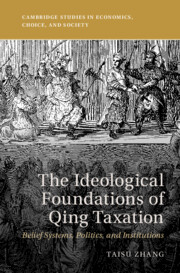6 results
Introduction
-
- Book:
- The Ideological Foundations of Qing Taxation
- Published online:
- 02 February 2023
- Print publication:
- 09 February 2023, pp 1-36
-
- Chapter
- Export citation
1 - A Short History of Qing Taxation
-
- Book:
- The Ideological Foundations of Qing Taxation
- Published online:
- 02 February 2023
- Print publication:
- 09 February 2023, pp 37-75
-
- Chapter
- Export citation

The Ideological Foundations of Qing Taxation
- Belief Systems, Politics, and Institutions
-
- Published online:
- 02 February 2023
- Print publication:
- 09 February 2023
4 - Australian Taxes
- from Part A - Introduction to Taxation and Australia’s Tax System
-
- Book:
- Foundations of Taxation Law 2022
- Published online:
- 01 February 2022
- Print publication:
- 25 January 2022, pp 72-90
-
- Chapter
- Export citation
9 - The late ʿAbbāsid pattern, 945–1050
- from PART II - UNIVERSALISM AND IMPERIALISM
-
-
- Book:
- The New Cambridge History of Islam
- Published online:
- 28 March 2011
- Print publication:
- 04 November 2010, pp 360-394
-
- Chapter
- Export citation
1 - North India
- from IX - Agrarian Relations and Land Revenue
-
-
- Book:
- The Cambridge Economic History of India
- Published online:
- 28 March 2008
- Print publication:
- 01 April 1982, pp 235-249
-
- Chapter
- Export citation

